Saint Leo’s Campaigns & Elections Class Immerses Students In November 5 Elections
Younger Voters Could Make Impact in Presidential And Other Races This Year, Political Science Instructor Says.

Younger Voters Could Make Impact in Presidential And Other Races This Year, Political Science Instructor Says.

With Election Day coming up on November 5, students in one political science class at Saint Leo University are becoming campaign experts while also learning the value of voting.
“It’s of the utmost importance for college students to understand campaigns and elections; these are future citizens,” said political science instructor Frank Orlando. In his Political Science 304 Campaigns & Elections class, Saint Leo students are “learning something that isn’t just nice to know,” Orlando said. “It’s their responsibility.”
Voting and being involved in politics is a habit-based behavior, he said. “The earlier you start and the more practice you get, you form a habit. We’re getting the students involved early, to start doing their duty as Americans. It’s something I am proud to help in any way I can.”
But will younger voters show up at the polls on November 5, and what impact will they make? It’s up to them, Orlando noted.
“Historically, voter turnout among younger voters is low,” he said. “It really is in their hands. We’ve seen elections where youth turnout has been higher like in 2008 when people were pumped up about a candidate, and even in 2020, when it was relatively easier for people to vote given the fact that it was easier to mail in ballots, even if you were home from college. It remains to be seen in 2024 the extent to which young voters will turn out to vote. If they do, it certainly can sway some of these states at the margin.”
Who young people vote for in the presidential election also is going to be interesting, Orlando said. “We know there is a little bit of a gender gap with voters with female voters supporting [Kamala] Harris and males supporting [former President Donald] Trump. Will that pattern continue with younger voters — will we see a kind of bimodal thing where younger men support Trump, younger women support Harris, it remains to be seen. But the numbers that they turn out with will be crucial in who wins each state.”
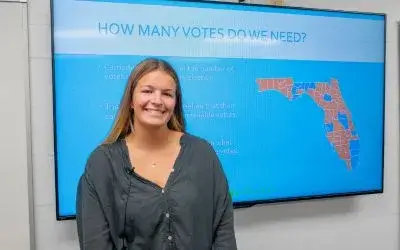
Junior political science major Erin Johnson said she thinks this election year is exciting. “There was the last-minute switch of Harris for [President Joe] Biden so that’s something we haven’t seen before, and that’s really exciting,” she said. “It’s such a toss-up and it really could go either way. I’m super excited to see who wins.”
Johnson said that voting matters because “that is how change is made and how citizens are able to voice their opinions.”
Salvatore Polizzi, a senior political science major from New York, said that current issues such as “housing affordability and immigration policies matter in society and elections help to find solutions to fix them” — by electing those who will find and implement those solutions.
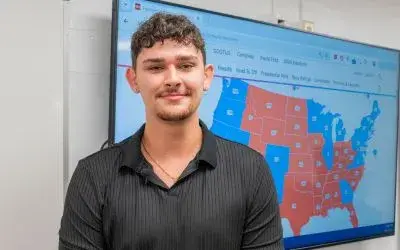
“This election is one of the closest in history,” Polizzi continued, “And I feel like nowadays it’s been a lot closer with the split between the two parties, so I think it’s going to be really interesting to see where these swing states end up.”
For Liliana Kozlowski, a senior religious studies major, the 2024 election is special, “I’m personally excited because this will be my first time voting in a presidential election,” Kozlowski said. “But then also being from out of state [New Hampshire] and studying at a school in Florida, I’m excited to go through the whole absentee ballot process as well. It’s interesting and it’s something I’ve never done before.
Learning ‘How the Sausage is Made’ - Campaigns & Elections Class
Students in the Campaigns & Elections course are becoming fully immersed in the November election. They are working on two projects — the campaign project in which they have to create a website and “pretend they are running a historical presidential campaign,” Orlando said. “And the big project is the battleground state project.”
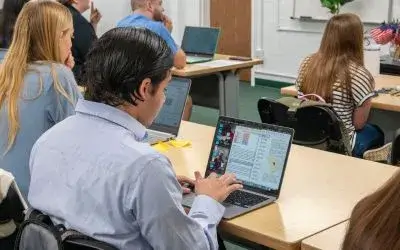
Each of the students was assigned a state about which they eventually have to write 6,000 words about the state. “They have to profile the state geographically and demographically, they have to talk about electoral history, and electoral geography, the amount of effort that each campaign is putting into that state in terms of amount of time in the state and money spent in advertising, and they have to provide a preview,” the political science instructor said.
Then on Election Night, the Saint Leo students will act as pundits for those states providing analysis as the results roll in, and “hopefully providing better coverage than TV,” Orlando said. “Then they have to provide a post-mortem about what happened in their state and why. They truly become the experts on their assigned state.”
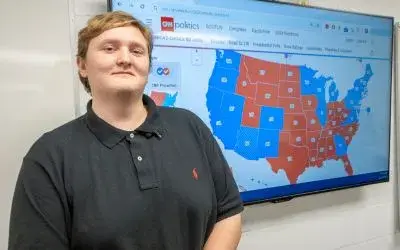
Sophomore Hunter Compton, a political science major, is becoming an expert on the state of Florida. While there definitely are some Democratic areas, he believes that Republican Trump will win eventually win the Sunshine State. “Especially with him doing more pushing [campaigning] toward groups that have a lot of hold on Florida, I do believe that he is going to take the cake,” Compton said. He also thinks that while the Senate race will be more contested and could go either way, incumbent Republican Rick Scott, will defeat Democratic challenger Debbie Mucarsel-Powell.
Polizzi, assigned his home state for the project, said he has learned a lot about New York, “especially about the different districts and what are the most important areas when it comes to voting and how highly populated the city is and how much it really defines the vote for our state.”
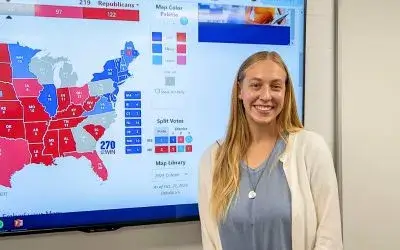
Kozlowski, who is becoming an expert on her home state of New Hampshire, said she learned more about counties other than her home county. “I’m learning more about the behind-the-scenes of it [campaigns) how the Senate races are influencing the presidential campaign.”
While they’re gaining an in-depth look at what it takes to run a campaign and win an election, the Saint Leo students also are learning valuable lessons in civics and why voting can make a difference.